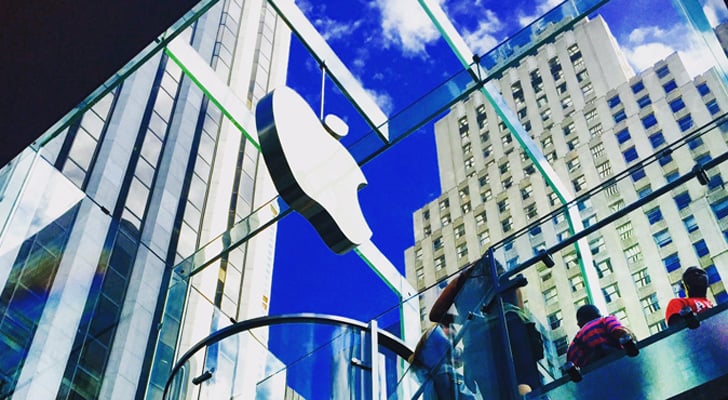Inarguably, among the most-discussed companies in the markets, Apple (NASDAQ:AAPL) and Amazon (NASDAQ:AMZN) have no problems generating headlines.
Even seemingly inconsequential statements or events can shake up investors. Recently, though, all eyes were on AAPL, and later AMZN, to see which industry giant would hit the vaunted one-trillion dollar market capitalization.
As we all know, AAPL took that honor several weeks ago. Not only that, market observers appreciated the style in which it got its business done. As our feature writer James Brumley stated, the trillion-dollar day was “just another workday” for Apple. Like an Andrea Pirlo penalty kick, management treated the banner moment as merely one step toward a greater goal.
Furthermore, the swing for the key benchmark wasn’t a flash in the pan. The consumer-electronics firm continued to add to its gains. Currently, AAPL sports a $1.02-trillion market cap, meaning that if it lost its trillion, Apple would still be a fairly large company. No other organization can say that.
This perspective coincides with one of Brumley’s main arguments that this milestone truly matters for Apple. When AMZN likely becomes the second trillion-dollar company, the media frenzy won’t have the same magnitude.
Furthermore, Apple’s stunning rise to the absolute top proves that mega-enterprises can not only exist, but thrive. In recent years, General Electric (NYSE:GE) and IBM (NYSE:IBM) became unwieldy, anachronistic entities. AAPL proved that with the right leadership and a focus on what works, even the big dogs can compete in today’s agility-centric business environment.
By moving into pole position, history will show that Apple set this new paradigm, not AMZN. However, being first isn’t all that it’s cracked up to be.
The Real Work Begins for AAPL
Brumley raises a great point mentioning Roger Bannister. He was the first person to break the four-minute-mile barrier. Before Bannister, everyone thought it was impossible for a human to run a mile that fast. Now, several people achieve that benchmark, but no one cares. We all remember Bannister.
Will we all remember Apple 50 to 100 years from now? As crazy as it sounds to say this at this juncture, history doesn’t favor AAPL.
For instance, the first company to hit a $1 billion market cap was U.S. Steel (NYSE:X). Later, General Motors (NYSE:GM) became the first to go to $10 billion. The $100 billion and $500 billion benchmarks go to IBM and Microsoft (NASDAQ:MSFT), respectively. While I’ve argued that IBM is steadily gaining relevancy, only Microsoft right now is decisively relevant.
Another way to put this is that human achievement is like a balance sheet. It’s a snapshot in time that’s forever etched in the record books. But publicly traded companies are essentially living entities. Past achievements don’t really mean anything.
In fact, past achievements can be a liability. How many times have we gone into an AAPL earnings report, only to compare iPhone growth rates to years past? Invariably, the metrics are disappointing because smartphones are no longer novel devices.
Let’s not forget that, ironically, Apple’s greatest product success came from being second. AAPL didn’t popularize mobile phones; that honor belongs to Nokia (NYSE:NOK). It also didn’t popularize the smart-device concept. Management improved BlackBerry’s (NYSE:BB) platform with touchscreen capacity.
Indeed, Apple didn’t invent the computer. It just made it look sleeker and took away a mouse button.
Of course, I jest, but here’s my point: Apple must now prove it’s a true innovator, not a brilliant duplicator.
AMZN Offers Superior Long-term Potential
I’m not here to necessarily bash Apple. Anyone can see that it’s a game-changing organization. At the same time, I’m sure people felt the same way about U.S. Steel in its heyday. If we learned anything from history, it’s that companies levered significantly toward one product are vulnerable to competition.
This is why if I had to choose between AAPL or AMZN, I’d go with the latter. For starters, its primary e-commerce business is unlikely to fall victim to competition. In fact, it’s quite the opposite: Amazon has ruthlessly disrupted most retail sectors.
So powerful is AMZN that the company is synonymous with the concept of e-commerce. How many times have you read an article about the “disruptive effect of e-commerce,” and you just knew the author was talking about Amazon?
Even more problematic for any would-be challengers, AMZN has entered lucrative markets with significant vigor. For example, Amazon, not Apple, dominates the smart-speaker market with 70% to 76% share of U.S. sales last year. Plus, it’s making its name known in content streaming and the cloud.
Finally, a major distinction between Apple and AMZN is hunger. Amazon runs their business as if it’s always trying to prove something. In my opinion, Apple appears out of ideas unless somebody else comes up with something, which it can improve upon.
Again, both companies have demonstrated that they are in an elite class. But moving forward, AMZN has the superior (and flexible) platform to generate greater upside.
As of this writing, Josh Enomoto did not hold a position in any of the aforementioned securities.

